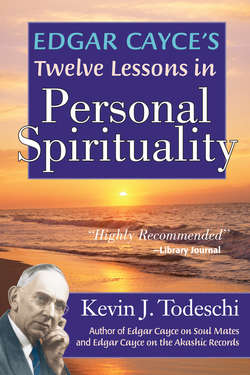Читать книгу Edgar Cayce's Twelve Lessons in Personal Spirituality - Kevin J. Todeschi - Страница 8
На сайте Литреса книга снята с продажи.
PREFACE
ОглавлениеIn September 1931 a group of ordinary people met with Edgar Cayce, an individual whom many consider to be one of the greatest mystics of all time. Although the meeting had been called in order for each of them to work more personally with Cayce’s psychic information, none of the group members could have possibly imagined the impact that meeting and their subsequent gatherings—nearly fifty meetings for the first twelve lessons—would have upon the rest of their lives, nor could the group have foreseen the effect of their work upon the lives of thousands of others even decades later.
Study Group #1, as they called themselves, worked for years to compile twelve essays in spirituality. Beginning with the lesson “Cooperation,” the essays were assembled in book form and published in 1942 as A Search for God, Book I. The group’s intent was to work with the material so it could be applied, understood, even “lived” in their daily lives. It was their hope that universal concepts might somehow be practically applied in such a manner as to bring a true awareness of the living Spirit into everyday life. In turn, they hoped that their relationships with those around them might somehow be positively affected through the process. The end result has been that these lessons in spirituality have been called one of the earliest and most effective tools for personal transformation introduced into the Western Hemisphere.
Although raised in a Christian upbringing, Cayce’s information is deeply ecumenical. These lessons in spirituality emphasize the oneness of all life, a love and tolerance for all people, as well as a compassion and understanding for every major religion of the world. In fact, one of the most important steps to personal transformation deals with the importance of cultivating an awareness of our oneness with all other individuals. Coming to share that same understanding, Study Group #1’s preface to A Search for God, Book I, ended with:
There is nothing new here. The search for God is as old as man. This book is passed on in the hope that through it, during the trying times ahead, many may glimpse a ray of light; that in other hearts it may awaken a new hope and vision of a better world through application of His laws in daily life.
Study Group #1 was told that they could “bring light to a waiting world” and that these lessons would still be studied a hundred years into the future. Today, many decades later, this material has been studied by thousands of individuals from every walk of life and religious background, enabling them to become more aware of themselves through cooperation, personal awareness, faith, meditation, and love. These interdenominational discussion groups examine this material on soul growth in individual homes all over the world. (If you are interested in visiting one of these groups, please contact A.R.E., 215 67th Street, Virginia Beach, VA 23451-2061.)
Since the Cayce work has been computerized, access to particular information is readily available in ways that even Edgar Cayce might have hesitated to predict. In addition to utilizing the same resource material provided to the original study group, this volume presents a topical overview of the entire body of Edgar Cayce readings on each of the twelve lessons. Many of the readings discuss the same subjects which had been presented to Study Group #1, but it was not until 1971 that the material was sufficiently indexed so that any topic could be studied in a way not available to Cayce’s early supporters. Twelve Lessons in Personal Spirituality is compiled in the hopes of serving one or more of the following purposes: as a tool for personal reflection and study, as a handbook for small group discussion, and even as a source of encouragement during those moments when the challenges of life seem more overwhelming than the beauty of it.
The hallmark of this material is that it suggests there is a definite purpose for living. There is also the promise that with a spiritual intent we can come to understand that purpose. We are all here for a reason, a reason that joins us in search of a common heritage. Though we may be separated by language, or religion, or customs, or race, or even vast distances, we all share the earth as our temporal home, we are all children of the same God, and we are all seekers along the way.
Kevin J. Todeschi
Virginia Beach, Virginia
